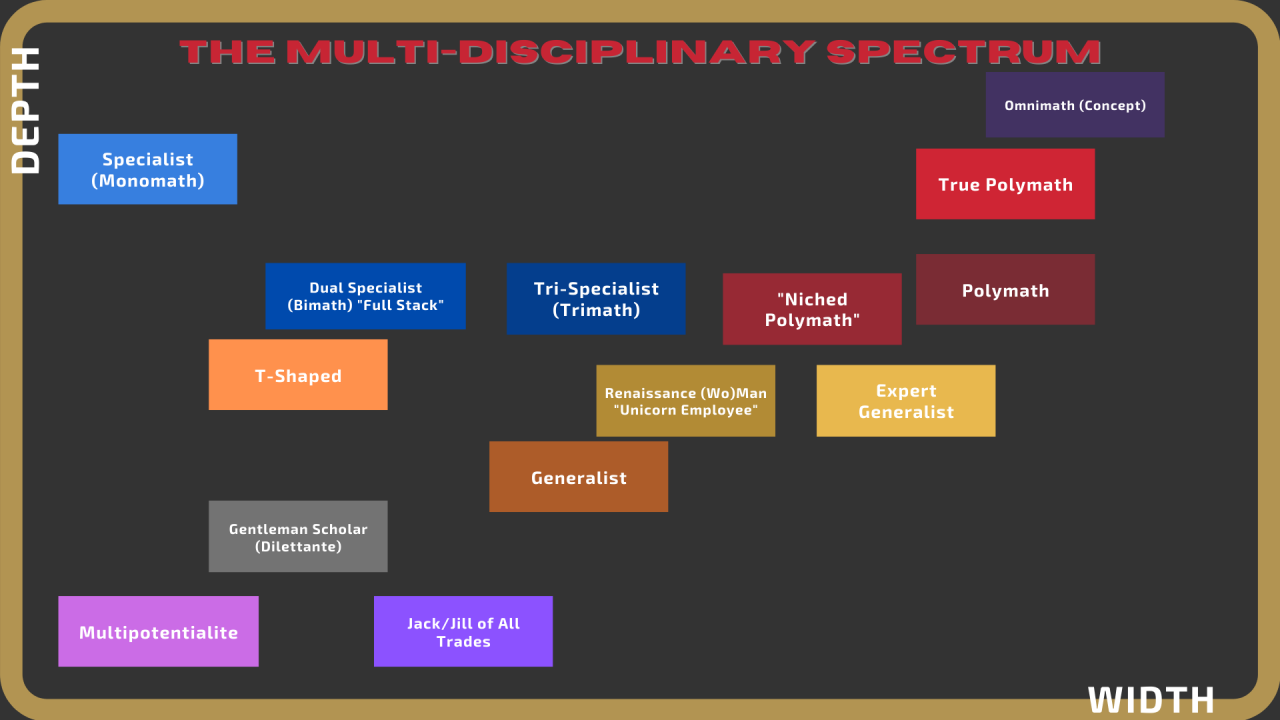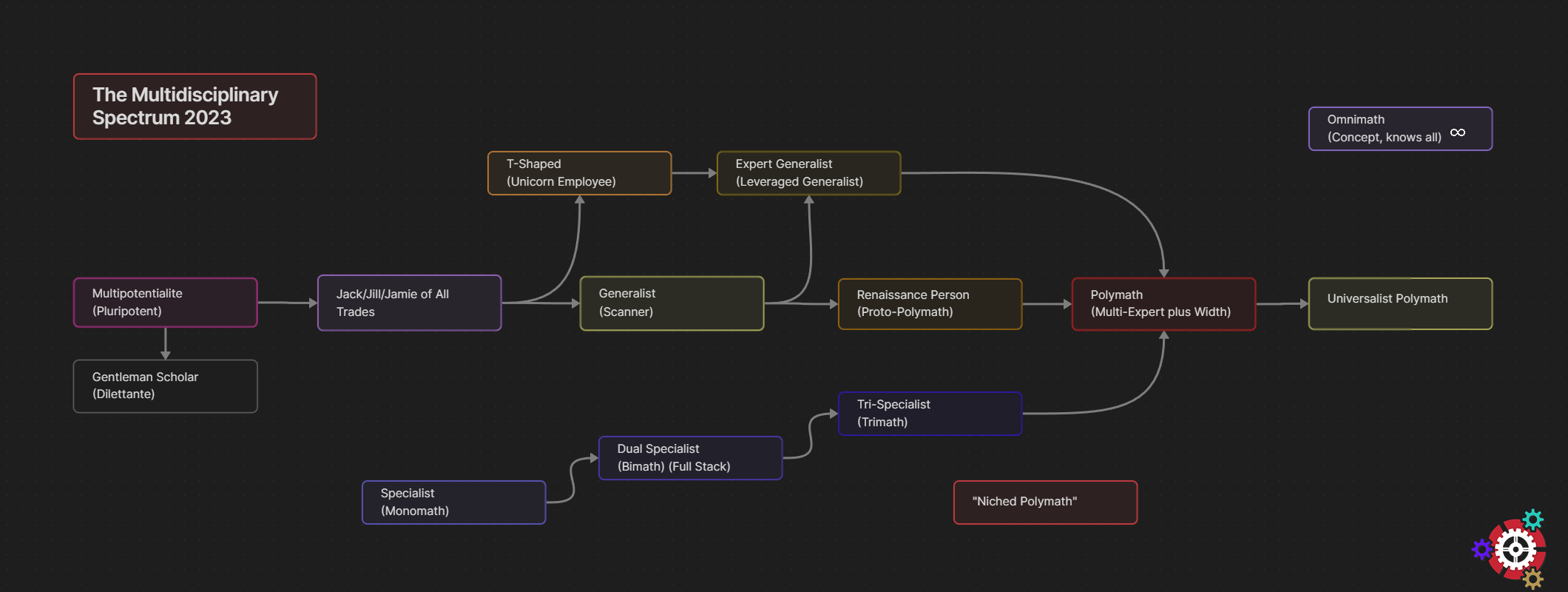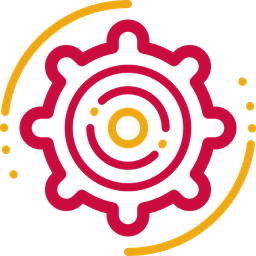One of my major contributions to the field of Polymathy, besides the 🧮 The Polymath Wiki newsletter/tag, is this Multidisciplinary Spectrum. A collection of terms related to how many areas of knowledge a person has attained.
I created this to be a sort of graph for people to find their "anchor term", which is a word they can identify with and help explain themselves to others better.
Each person is different, has different areas of knowledge, and different levels of deep knowledge. This helps you find where you are at, and where you should go next!
I have been wanting to make a post on how to actually use the Multidisciplinary Spectrum for a while. I'm going to first talk about the point of it, then list out the levels/branches, and finally explain how to use it.
Here is the Multidisciplinary Spectrum:

I tried to include any multidisciplinary term I could, even Scanner. The one I'm not the most happy with placement wise is the Hyper-Specialist. It sort of is confusing with the "niched polymath" angle. However I can explain that later.
For now just focus on the leveling up angle of things.
Think of all of these terms in a cloud of words, that they all can describe a person's knowledge levels. We need to be able to quantify width and depth of knowledge. Your brain doesn't just hold the knowledge of your career, but of your skills/hobbies/+ more.
I think that some terms need more clarification, which is why I made a series on this Spectrum.
Why create the Spectrum in the first place?
The various different terms to me seemed to fall in line with each other. Where others saw synonyms I saw a pattern, and I wanted to express that with you all.
With my background in fitness and personal knowledge management, there was this ingrained notion of progression. Always trying to improve and be better.
How does it branch off? Why?
Given that some of these terms include specialization, or compare to it in some way. I felt that I needed to visualize how T-Shaped people, Specialists, dual Specialists, etc all compare to the main Polymathy part of the spectrum.
I've gone through multiple iterations of the chart's design, but this latest one I feel does it best for how it flows. I'm not sure if it is the best when it comes to expressing the levels of knowledge areas. However it does do well showing the start to end points.
What are the levels?
I think it will be easier to talk about the main timeline in the middle. Then I'll go into the adjacent timelines for extra context!
A quick note the "true polymath" spot got some backlash, as it came across as "being better". That isn't the case, as it was simply to exemplify the level of knowledge. I figured generalist is more middle level of knowledge in a few areas, polymath being higher than that (around expert level), and true polymath being more of a deep expert (top 20 % kind of thing) in many areas.
At least a deep expert in 2, and semi-expert in 2 or more additional fields. In later revisions of this chart I changed it to "universalist polymath". The chart isn't meant to be a work of art, rather be a tool to help people identify where they're at, but I do think it needs more of an aesthetic appeal too. While I love the Multipotentialite movements, there needs to be an understanding that it is more of a starting point. A mindset too, as people who find that term finally have something to market themselves as. That is the biggest benefit I've seen for people with it, where they finally have a way of expressing/explaining themselves.
However having the POTENTIAL to do many things, is different than doing multiple things for a period of time. If it is a short period of time, and you have more of a novice level in many areas. Then that is a short depth, vast width, which is a Jack of all trades (maybe T-shaped if you happen to have a specialty too).
Given enough time spent in those fields, there would have been SOME opportunity cost of time to focus. Narrowing down the vast width, to a more manageable amount of 3-5 areas, and that entails a Generalist level of medium depth.
Given enough focus on a few areas, one could theoretically be a dual or triple specialist. In fact I think that placement is far more common, than what people would originally predict.
The Polymath Pathway

This used to be called the Polymath Spectrum actually, which is a prudent thing to mention. To me anyone can become a polymath through just sheer will, determination, and overall living long enough.
However to be Polymathic is another story. For a lot of polymathic people like Multipotentialites or Generalists, they are like that natively. It is ingrained into the way their brain works.
This pathway entails the flow of doing over a dozen things, and over the course of your life those things funnel down into a few different specialties. While some polymaths would like to think they can do it all, in reality without proper time management. Let alone deliberate practice especially, then you won't even accomplish even your few ones super deeply.
You have to plan super well in order to do more than 3 areas of expertise in your life.
A quick note on Polymathy
For the time being there are three levels.
- Niched Polymath, that of someone with 3 areas of deep knowledge in closely related fields. Akin to my PolyInnovator concept, or that of maybe a CompSci Engineer maybe.
- Traditional Polymath, something more of a diverse set of interests, but once again at a deep level. Think 60-80% depth of knowledge, and usually it seems more towards the 80th percentile.
- Finally we have the Universalist Polymath. I'm not sure if both of these descriptions are true, or if it is some combination of the two. That of a traditional polymath, with the added combination of a jack of all trades novice level in many additional areas. OR the idea of being top 30-20% in 3-8 fields. So an even more deeply specialized polymath.
The Specialist Pathway

Probably the most common one to most people, as our society for the last 100 years has forced this narrative of doing "one thing". That specialization has limited our progression immensely over the last 50 years, and while I think it was helpful during the industrial revolution. The constant niching down has lead to a lack of innovation.
We have seen a rise in the last 15 years or so towards this trend going into two specialties. Combining those two expertise into a new hybrid field, such as BioTechnology.
I have seen in some cases these interesting situations where someone is a Tri-Specialist, and you might think that is more akin to a Polymath. However there is a difference.
Not everyone with 3 areas of specialist expertise has that transcontextual knowledge/skill, ingrained curiosity, and integration between fields. Which are the differentiating factors for being a polymath.
The Leveraged Generalist Pathway

This is a more unique, or even could say Modern pathway, as these are more modern terms. T-Shaped originating in the marketing world for having many different sub-skills in marketing, with perhaps one area of deeper knowledge. I still think it is more medium-adept level, quite like the Generalist. However it is more of a jack of all trades level of knowledge when it comes to the width.
Over time if the person were to build up all of their skills. I.e. their singular specialty from medium to deep level of knowledge, and their wide range of skills from novice/adept to medium level of knowledge. Then they more or less fit into the Expert Generalist anchor term.
From there if they build up 2 more areas of knowledge to expert level, in addition to their 1 they already have. Then they will become a polymath.
What are the numbers for each term?
Note: This is perhaps subject to change, as I want more data before I set these term's ranges in stone. However this is what I have come up with in the meantime.
I'll explain in the next section how I came to the conclusion of these ranges. I have to take a branching chart, and list them out sequentially. I'll try to place them accordingly, or next to each other in range.
"The Scale of Expertise"
I realized that I should probably explain what the scale looks like, and I'm not sure how I came onto it. Probably from video games or something like that, but here it is from beginner to master.
Beginner > Novice > Adept > Journeyman > Expert/Specialist > Master


All three are viable in usability, but I'll be using mine for explaining the areas of expertise for each term on the Spectrum.
Multipotentialite - (Pluripotent):
12-15 Areas - Beginner
Now this could technically be infinite, but I think the best approach is that of "15+ areas". At least a dozen interests, and not much time spent in any of them. That is okay though because this person is experimenting, following their passions, and finding out where they want to go.
Hence the biological term Pluripotent, as it means they can fit and mold into any area. They are blank slates, that can be put anywhere.
Jack/Jill/Jamie of All Trades (Multi-Passionate):
9-12 Areas - Beginner/Novice/Adept
Very much like the Multi, this type of person will be passionate about a dozen different things. Trying to do them all, and overall starting to find what they truly like. The saying of "putting your hands in all of the cookie jars" is relevant here, and I like to think of it as trying to find the cookie you like. Once you do, then you learn how to make it yourself.
Thus leading down a specialization, and the cycle repeats too over life as the The Hourglass Analogy.
I should note that a percentage of JoATs are quite polymathic, as in having deep specializations in addition to their wide range. However usually I'd end up classifying those people as "Expert Generalists" or the quintessential "Polymath". However they themselves still anchor to Jack of All Trades.
Specialist - (Monomath):
1 Area - Specialist
Again specialism is only a relatively modern thing in the course of human history. Most people had to have a multitude of skills simply to survive. I.e. the town blacksmith had to know how to farm or cook for his family.
However as the factory mindset became more and more embedded into our culture. The global norm became that of gaining one skill really deeply, and that being who you are to society.
Alas that isn't really the case as even specialists have hobbies, parenting skills, previous careers, and the time in life to learn something else too.
T-Shaped - (Unicorn Employee):
1 Main Area/8-10 Sub Areas - Adept/Journeyman for Main+ Novice for Sub Areas
Spawning out of the marketing world to find that "unicorn" employee who Can Do It All! While I think for a time there it was possible to a degree with marketing skills. The platforms have evolved at such a rapid rate, that you need a person who is more of a jack of all trades, with one specialty now. Allowing for other team-members to fill in the gaps.
The T shape description is that of a jack of all trades type of width, meaning many-many skills at a novice or adept level, and one area that is a lot deeper. Presumably closer to a medium level of competency in most cases.
Dual Specialist - (Bimath; Full Stack):
2 Areas - Specialist
Pretty self-explanatory, as it simply is a two skill person. Each being that of an expert level. Ideally the Bimath would have integration between the two fields, and is seen as a combination of both.
I also like the idea of a "Full Stack" person, and this coming from the programming/coding world. A full stack developer being able to work on the backend of projects, the stuff you don't see like databases. However they can also work on the frontend of things, the stuff you DO see like the website or app.
This Full Stack concept though can be attributed to other fields as well.
Generalist - (Proto-Polymath; Scanner):
5-7 Areas - Adept/Journeyman
This is where some contention happens, as some people see the generalist/JoAT/polymath as meaning the same thing. Though that is not the case, as the generalist has not achieved a deep specialist expert level yet.
A generalist is more of a jack of all trades that has picked half a dozen fields to spend more time in. Going from a novice to a medium level of understanding in those fields. I always say in The Polymath Wiki that if you juggle between areas long enough, then you'll eventually build all of them up.
If a Generalist has 6 areas of medium expertise, but one of them becomes a true specialist level of understanding eventually, then that will make the person become an Expert Generalist (see below).
Tri-Specialist - (Trimath):
3 Areas - Specialist
I do see this as separate from the polymath simply due to the integration of all the fields. Perhaps it is a fine line between Trimath and Polymath, given that a polymath is 3 or more areas of expertise.
However I think the transcontexual knowledge between the fields is an important angle, that not every Tri-Specialist tend to take into account. They see each of their skills as disparate areas, and they don't integrate each of them.
It could also be the case of someone who had 3 sequential careers, and they haven't combined them into something new yet.
Expert Generalist - (Leveraged Generalist):
1 Main Area/3-5 Sub Areas - Specialist for Main Area/Adept or Journeyman for Sub Areas
Simply a generalist with one area of main expertise. They may have started out really interested in one thing too, but over time another one of their skills took the lead. Eventually two of their fields might become an expert level, and I like the idea of a dual expert generalist as another spot on the spectrum.
Though it seems to me that it is a slippery slope at that point to polymathy! The Expert Generalist is already good at transcontextual thinking, and bringing together different fields.
Hyper-Specialist - "Niched Polymath":
3 Areas - Specialist Polymath in Similar Fields
Something I came up with when conceptualizing PolyInnovator itself, as I see my personal brand as the "Polymath of Innovation". Really narrowing the focus towards the innovating factor. Not so much the fields themselves being innovated.
Although I think a better example is that of a niche scientist, with 3 areas of expertise in Physics or Biology, etc.
While the different fields of biology are completely different specializations. They are still part of the field of biology, and therefore niched.
Polymath - (Multi-Expert plus Width; PolyHistor):
3+ Specialist Areas with Insatiable Curiosity
The culmination of all of your disparate fields. Someone who has become an expert in many fields. Normally from what I can tell somewhere in the Expert to Master range. While some polymaths might go into hyper-specialization in addition to their already deep knowledge.
They tend to spread out more again quite like the jack of all trades. Really embracing that wide range, as they realize that there isn't enough time to consume everything. Although we want to try to regardless! #curious
Universalist Polymath - (Renaissance Person):
7+ areas of Expert Level or 3+ areas at a Master level
Think of this like a level up from a Polymath, as technically they mean the same thing, but in practice you'll see a difference. Its like comparing a person with multiple specialties to Leonardo Da Vinci.
This level is for people who have actively pursued polymathy, presumably all their life, and knew from the beginning that they wanted to do many different things. There was no doubt per se.
This isn't to say you couldn't achieve, in fact I fully support you trying to actually, but it is just something that takes 80,000 hours type of thing. Meaning if you're too old, then you may not have enough time (prove me wrong!).
Omnimath - (Concept, knows all):
♾️ Infinite
On the opposite end of the spectrum, we have the what is essentially impossible to achieve. The Omnimath. A concept that I came up with (along with a couple others, such as on reddit or twitter, at different times), that is what most people actually think a Polymath is.
Omni meaning ALL, an Omnimath is knowing all subject matters/areas. Now technically it is impossible, even if you were immortal really, as the human species constantly discovers new things in countless fields every year/decade.
However it is put there to be sort of a cap to it all it.
If the potential to do anything, multipotentialite, is the start; Then knowing all, is the end.
This is literally just a concept to give some sort of context to the scale of things. Even if you had a time machine, there wouldn't be enough time for you to learn everything there is to know. Even if you were immortal, the change rate of information happens too fast.
It is just a fascinating concept, that I thought fits into the maximalist part of the Spectrum.
Where did I get the numbers for quantification?
This is where my opinion needs to be called out, and if someone contests then I'd like to know so we can improve the Spectrum.
However nothing I've said has been proven false, besides perhaps the "jack of all trades", but that is debatable (I'll explain).
Each term has a historical context of people who identify or have been identified post-mortem as one of these monikers. Other terms like Polymath have had researchers discussing "what quantifies a polymath?" for years, and one thing we can all agree on is at least 3 areas of deep specialties, with an ingrained deep curiosity.
From there I worked backwards. The Expert Generalist was that of someone with 1 main focus, but a wide range. Much like a T-Shaped person, but with more depth, so that came rather easily. It was more the Specialists that I had trouble with, and trying to figure out if you were say a niche polymath, as in 3 specialties in Physics.
I.e. Astrophysics, Biophysics, and say Kinematics. Then you wouldn't necessarily be a Polymath, as they're all related to one field, BUT you aren't really a specialist either. You're a hyper-specialist in the field of Physics, but you are wide ranging like a Polymath. Hence why I came up with the Niched Polymath term.
It is all about what you Anchor to, and can Explain Yourself as!
The whole chart is meant to be able to allow people to identify where they are at in their quest for knowledge and lifestyle. It allows you to find a term to identify with, to anchor to, and to market yourself with to recruiters or bosses.
That isn't to say they will always respond well, but it helps to make that attempt to explain. If not actually working in other times.
The philosophy behind this spectrum isn't to make anyone who has less areas of knowledge feel bad. Rather it is to motivate that person to do more, and that they have higher levels they can achieve. To me I'm always about leveling up, and I always tried to convince my fitness clients that you can ALWAYS get 1% better.
Let alone perhaps adding a new area of expertise to your life!
Previous Shorter Version
I'm including this version, as I changed a lot in this post, so I wanted to give you context!

This was one of my "social articles", an experiment to create medium sized blog posts, akin to newsletters. Across a variety of social blogging networking platforms. Such as Medium, and Linkedin. Since it didn't quite land; I decided to take these posts and remake them into more full length creations.
However I have since completely changed this post.

While this image above was made to be a placeholder, it does give off the idea I'm trying to convey. Think of all of these terms in a cloud of words, that they all can describe a person's knowledge levels. We need to be able to quantify width and depth of knowledge. Your brain doesn't just hold the knowledge of your career, but of your skills/hobbies/+ more.
I think that some terms need more clarification, which is why I made a series on this Spectrum.

A quick note the "true polymath" spot got some backlash, as it came across as "being better". That isn't the case, as it was simply to exemplify the level of knowledge. I figured generalist is more middle level of knowledge in a few areas, polymath being higher than that (around expert level), and true polymath being more of a deep expert (top 20 % kind of thing) in many areas. At least a deep expert in 2, and semi-expert in 2 or more additional fields. In later revisions of this chart I changed it to "universalist polymath".
The chart isn't meant to be a work of art, rather be a tool to help people identify where they're at, but I do think it needs more of an aesthetic appeal too. While I love the Multipotentialite movements, there needs to be an understanding that it is more of a starting point. A mindset too, as people who find that term finally have something to market themselves as. That is the biggest benefit I've seen for people with it, where they finally have a way of expressing/explaining themselves.
However having the POTENTIAL to do many things, is different than doing multiple things for a period of time. If it is a short period of time, and you have more of a novice level in many areas. Then that is a short depth, vast width, which is a Jack of all trades (maybe T-shaped if you happen to have a specialty too).
Given enough time spent in those fields, there would have been SOME opportunity cost of time to focus. Narrowing down the vast width, to a more manageable amount of 3-5 areas, and that entails a Generalist level of medium depth.
Given enough focus on a few areas, one could theoretically be a dual or triple specialist. In fact I think that placement is far more common, than what people would originally predict.
If it is three or more deep levels of knowledge, that means in essence a polymath level. However I do think there are multiple levels to polymaths itself, and the amazing researchers in the field of polymathy are working on identifying that scale too.
For the time being there are three levels.
- Niched Polymath, that of someone with 3-4 areas of deep knowledge in closely related fields. Akin to my PolyInnovator concept, or that of maybe a CompSci Engineer maybe.
- Traditional Polymath, something more of a diverse set of interests, but once again at a deep level. Think 60-80% depth of knowledge, and usually it seems more towards the 80.
- Finally we have the Universalist Polymath. I'm not sure if both of these descriptions are true, or if it is some combination of the two. That of a traditional polymath, with the added combination of a jack of all trades novice level in many additional areas. OR the idea of being top 30-20% in 3-4 fields. So an even more deeply specialized polymath.
On the opposite end of the spectrum, we have the what is essentially impossible to achieve. The Omnimath. A concept that I came up with (along with a couple others, such as on reddit or twitter, at different times), that is what most people actually think a Polymath is.
Omni meaning ALL, an Omnimath is knowing all subject matters/areas. Now technically it is impossible, even if you were immortal really, as the human species constantly discovers new things in countless fields every year/decade.
However it is put there to be sort of a cap to it all it.
If the potential to do anything, multipotentialite, is the start; Then knowing all, is the end.
The whole chart is meant to be able to allow people to identify where they are at in their quest for knowledge and lifestyle. It allows you to find a term to identify with, to anchor to, and to market yourself with to recruiters or bosses. That isn't to say they will always respond well, but it helps to make that attempt to explain. If not actually working in other times.
In the next version I have added things like "Scanner", "Linkybrain", and more to help more people find their spot! :D
![Official Website for Dustin Miller PolyInnovator [LLC]](https://www.polyinnovator.space/content/images/2025/03/polyinnovator-logo-2024.png)













